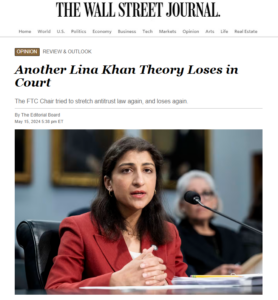In a recent ruling that has captured the attention of the legal and business communities alike, Federal Judge Kenneth Hoyt delivered a decision that reinforces the limits on the FTC’s authority to pursue claims against a minority investor for past conduct.
The Federal Trade Commission (FTC) brought its lawsuit against private equity firm Welsh, Carson, Anderson & Stowe and the company in which it had invested, U.S. Anesthesia Partners, alleging monopolization of the anesthesiology market in Texas through a series of “roll-up” transactions and other agreements. The Court granted Welsh, Carson’s motion to dismiss, and the Editorial Board of the Wall Street Journal commented on the case and its implications.

Federal Judge Kenneth Hoyt on Monday [May 13, 2024] rejected the case against Welsh Carson, which holds a 23% stake in the anesthesiology group. The agency didn’t “cite any authority for the proposition that receiving profits from an entity that may be violating antitrust laws is itself a violation of antitrust laws,” he noted.
The FTC said Welsh Carson “masterminded” a plan to buy competing anesthesiology practices in Texas and “remained deeply involved in crafting and executing that plan.” But even if the group violated antitrust laws, the judge held that the private equity firm couldn’t be held legally responsible merely because it had profited as a result.
The agency “has not cited a case in which a minority, noncontrolling investor—however hands-on—is liable . . . because the company it partially owned made anticompetitive acquisitions,” Judge Hoyt wrote. Under Ms. Khan’s inventive theory, any asset manager could be sued for a company’s alleged anti-competitive conduct if it holds shares. The agency “has not cited a case in which a minority, noncontrolling investor—however hands-on—is liable . . . because the company it partially owned made anticompetitive acquisitions,” Judge Hoyt wrote. Under Ms. Khan’s inventive theory, any asset manager could be sued for a company’s alleged anti-competitive conduct if it holds shares. The agency “has not cited a case in which a minority, noncontrolling investor—however hands-on—is liable . . . because the company it partially owned made anticompetitive acquisitions,” Judge Hoyt wrote. Under Ms. Khan’s inventive theory, any asset manager could be sued for a company’s alleged anti-competitive conduct if it holds shares.
Ms. Khan hoped to use the case to expand liability under antitrust laws and set a precedent that the agency has the power to unroll minority-stake acquisitions. The FTC’s new merger review guidelines say that a “minority position may permit influence of the target firm” and “implicate strategic decisions” or “change incentives so as to otherwise dampen competition.”
Her theory is a major departure from antitrust laws, as the judge noted. Ms. Khan keeps losing cases because she ignores the consumer welfare standard and other bedrock antitrust principles. Yet she trumpets legal defeats as victories and keeps grinning like she’s winning.